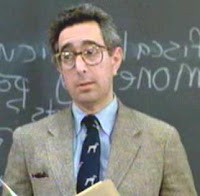Thursday night's Republican Presidential Debate included a question about education. Candidates were given thirty seconds each to respond. (Does that say something about the value of education?) We've included the question below, candidate responses, and a brief commentary from the Teaching Underground for each. Enjoy.
QUESTION: I've taught in both public and private schools, and now as a substitute teacher I see administrators more focused on satisfying federal mandates, retaining funding, trying not to get sued, while the teachers are jumping through hoops trying to serve up a one-size-fits-all education for their students. What as president would you seriously do about what I consider a massive overreach of big government into the classroom? Thank you.
FORMER GOV. GARY JOHNSON, R-N.M.: I'm promising to submit a balanced budget to Congress in the year 2013. That's a 43 percent reduction in federal spending.
I am going to promise to advocate the abolishment of the federal Department of Education.
The federal Department of Education gives each state 11 cents out of every dollar that every state spends, but it comes with 16 cents worth of strings attached. So what America does not understand is that it's a negative to take federal money. Give it to 50 laboratories of innovation, the states, to improve on, and that's what we'll see:
dramatic improvement.
Abolish the Federal Department of Education? That sounds pretty Anti-Education to many folks, but maybe not. If Johnson is right, it's costing more than it's worth.
FORMER SEN. RICK SANTORUM, R-PA.: Yeah, 20 years ago, the federal contribution to education was 3 percent. It's now at 11 percent, and our schools are doing worse, and it's exactly what Gary Johnson just said. It's because the federal government's meddling.
The bottom-line problem with education is that the education system doesn't serve the customer of the education system. And who's the customer? The parents, because it's the parents' responsibility to educate the children.
It's been that responsibility -- from the moment they were born, they began the education of their children. And at some point, we have-- the government has convinced parents that at some point it's no longer their responsibility. And in fact, they force them, in many respects, to turn their children over to the public education system and wrest control from them and block them out of participation of that.
That has to change or education will not improve in this country.
I can't say that I totally disagree, but we have a public trust. Sometimes parents will not live up to their responsibility and with this attitude I fear the children suffer. How do we adjust education to make sure we're responsive to parents? I must say, I don't think the feds can do much for us there.
FORMER SPEAKER OF THE HOUSE, NEWT GINGRICH: I think you need very profound reform of education at the state level. You need to dramatically shrink the federal Department of Education, get rid of virtually all of its regulations.
And the truth is, I believe we'd be far better off if most states adopted a program of the equivalent of Pell Grants for K-through-12, so that parents could choose where their child went to school, whether it was public, or private, or home-schooling, and parents could be involved. Florida has a virtual school program that is worth the entire country studying as an example.
I'm always a little leery of the baggage associated with vouchers and choice talk. And technology should facilitate education, but this virtual school example sounds too much like technology as a solution to education problems.
REP. RON PAUL, R-TEXAS: If you care about your children, you'll get the federal government out of the business of educating our kids.
In 1980, when the Republican Party ran, part of the platform was to get rid of the Department of Education. By the year 2000, it was eliminated, and we fed on to it. Then (inaudible) Republicans added No Child Left Behind.
So the first thing a president should do is -- the goal should be set to get the government out completely, but don't enforce this law of No Child Left Behind. It's not going to do any good, and nobody likes it. And there's no value to it. The teachers don't like it, and the students don't like it.
But there are other things that the federal government can do, and that is give tax credits for the people who will opt out. We ought to have a right to opt out of the public system if you want.
O.k. Ron, I'm with you on decreasing federal involvement, but you lost me at "business of education." It's not a business, and we need some form of government guarantee of access to education.
GOV. RICK PERRY, R-TEXAS: There are a lot of good ideas here on the side and whether it is cutting back on the Department of Education, making those types of reductions.
I happen to believe we ought to be promoting school choice all across this country. I think school -- the voucher system, charter schools all across this country. But there is one person on this stage that is for Obama's Race to the Top and that is Governor Romney. He said so just this last week. And I think that is an important difference between the rest of the people on this stage and one person that wants to run for the presidency.
Being in favor of the Obama Race to the Top and that is not conservative.
Tell us what you think about education Mr. Perry, not your opponents. I'll slam Race to the Top right along with you, but you need to tell us more about what you're for than what you're against. Once again, the voucher and choice talk can mean many things, and too often on this side of the isle it means harm to public education.
FORMER GOV. MITT ROMNEY, R-MASS.: Nice try.
Let me tell you what I think I would do.
One, education has to be held at the local and state level, not at the federal level. We need get the federal government out of education. And secondly, all the talk about we need smaller classroom size, look that's promoted by the teachers unions to hire more teachers. We looked at what drives good education in our state, what we found is the best thing for education is great teachers, hire the very best and brightest to be teachers, pay them properly, make sure that you have school choice, test your kids to see if they are meeting the standards that need to be met, and make sure that you put the parents in charge.
And as president I will stand up to the National Teachers Unions.
You're dead on about state and local control Mitt, but you've fallen for the teacher union myth. Do you really think that a group of average income teachers paying dues to a union has more clout than the multi-million dollar multi-national corporations like Pearson and Rupert Murdoch's educational ventures. I want a president who will encourage governors to work with Teacher's Unions (who represent the folks who deal with students day in and day out) and stand up to the corporate interests who are driving school reform today.
REP. MICHELE BACHMANN, R-MINN.: We need that to do with education what has always worked historically, and that's local control with parents. What doesn't work is what we see happen right now.
I'm a mom five biological kids. We've raised 23 foster children in our home. The reason why I got involved in politics was because of the concern I had about our foster children and the education they were getting. What I would do as president of the United States is pass the mother of all repeal bills on education. I would take the entire federal education law, repeal it. Then I would go over to the Department of Education, I'd turn off the lights, I would lock the door and I would send all the money back to the states and localities.
Maybe not a bad idea, but again, we do need a government to at least guarantee that localities and states are living up to their responsibility to educate the children of America.
HERMAN CAIN, BUSINESSMAN: A lot of good ideas, I won't repeat them.
All of the programs at the federal level where there's strings attached, cut all the strings. We have got to encourage parents to take advantage of choices, but provide those choices and we must find ways to empower the students. This is how we are going to improve education, but primarily get the federal government out of trying to educate our kids at the local level.
Sounds great to me. I'd like to know more specifics.
FORMER GOVERNOR JON HUNTSMAN, R-UTAH : This is a key question, because it has so much to do with our nation's competitiveness. I feel like I've run my own clinical trial in my home, raising seven kids. We've seen every option. We've experienced everything out there. But as governor I learned some important things. I signed the first -- or the second voucher bill in the United States, Carson-Smith. I've actually done something about this.
We actually worked on early childhood literacy. If you can lock in the pillars of cognitive development around reading and math before age six, you are giving those kids the best gift possible as they then proceed through education.
Finally, you've got to say no to unfunded mandates coming out of Washington. They are totally unacceptable. No one loves their schools more than parents and local school boards, and local elected officials.
Again, not sure about vouchers, but kill the unfunded mandate.
There you have it folks. The republican take on education in thirty seconds or less (per candidate). Here's to informed decision-making and an educated electorate.
(
thanks to Fox News for transcript details from the debate)















